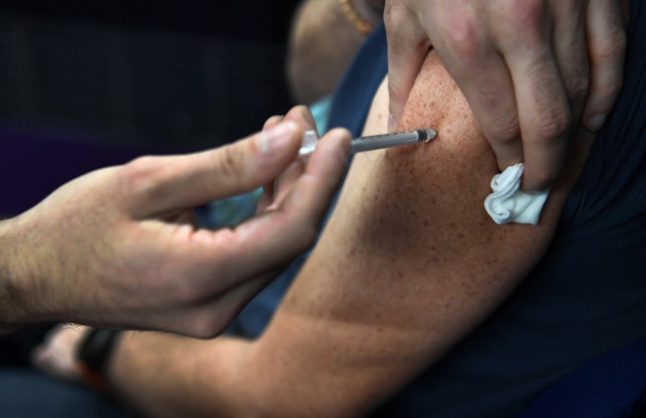The goal of the vaccine pass has been clear from the beginning: to increase vaccination coverage among the French population.
Currently 79 percent of the total population have had at least one dose of vaccine, while 93 percent of over 12s have had their first dose.
But as France introduced its vaccine pass – effectively barring the unvaccinated from a wide range of venues including bars, cafés, gyms and long-distance trains – there was a concessions aimed at people who are only now having their first dose.
Those who get their first dose within the next month can use proof of a first dose coupled with a negative Covid test to access venues, rather that the usual double-dose requirement.
At a press conference last week, French Prime Minister Jean Castex said: “We are going to allow those who get their first dose between now and February 15th to use the vaccine pass under two conditions – that they get their second one month later and in between this period, that they use negative covid tests valid for 24 hours”.
He described the vaccine pass as “a protective tool that allows [us] to boost first-time vaccinations”.
Since the announcement in December that the health pass would become a vaccine pass, 1 million adults have had their first dose, he added.
Holding a valid vaccine pass – which anyone over the age of 16 now needs to gain access to various public venues like restaurants, cinemas and museums – is contingent on being fully vaccinated (including a booster if applicable), having proof of recent recovery from Covid, or having a certificate stating that you cannot be vaccinated for medical reasons.
READ MORE What changes on Monday as France introduces the vaccine pass?
READ MORE When is France lifting Covid restrictions?
While the vaccine pass applies to anyone of the age of 16, it is not currently required for students or teachers in high schools.
If you are caught presenting a fake vaccine pass, or someone else’s vaccine pass, you have the option to have the €1,000 fine waived if you commit to getting vaccinated within the month.
How will this work?
If you are unvaccinated and get your first shot on January 24th, you can scan the result of your test into the TousAntiCovid app and you will be able to access vaccine pass venues up until February 24th – if you take a negative covid test within 24 hours before you access the venue (this test result can also be scanned into the app).
If you don’t own a smart phone or prefer not to use the app, you can also carry paper versions of your proof of vaccination and negative Covid test result. Proof of vaccination will either be given at the vaccination site, or if you have a carte vitale, you can also download it from ameli.fr – the French public health service website. Proof of a negative Covid test will normally be sent to you via email or SMS, with a link to the SI-DEP website.
On February 24th, one month after receiving your first vaccination you would have to receive your second dose to carry on using the vaccine pass – but you will no longer need to keep taking negative covid test to access venues.
You will then have four months to receive a third (booster) dose before your vaccine pass will be deactivated – as by then, the window in which you must receive a booster dose to carry on using the pass will be reduced from 7 months.



 Please whitelist us to continue reading.
Please whitelist us to continue reading.
Is anyone still under the illusion that this is about health any more, with Omicron now prevalent, it’s about authoritarian control, coercion and punishment.